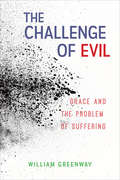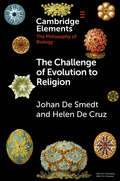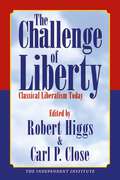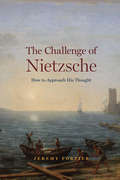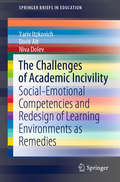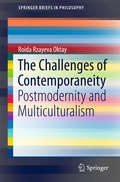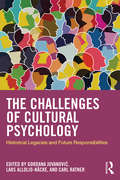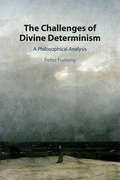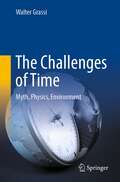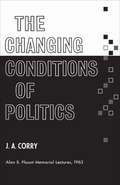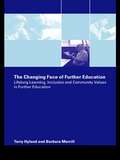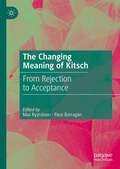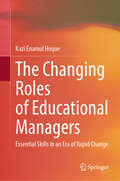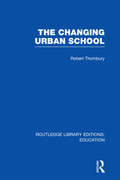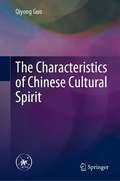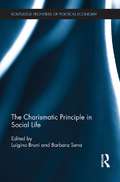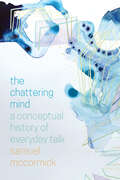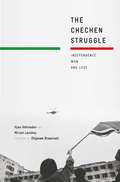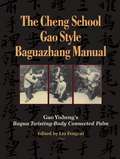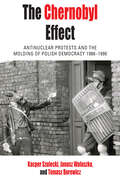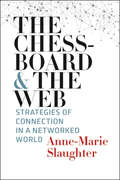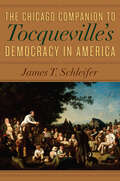- Table View
- List View
The Challenge of Enlightenment, Conflict Transformation and Peace in Pakistan
by Moonis AhmarThis book looks at the process of cultural enlightenment in the context of Pakistan. It undertakes an interesting and in-depth research focusing on how the world’s second largest Muslim state can learn from Europe’s heritage of enlightenment. It studies why Pakistan lacks a process of awakening and what the scope of cultural enlightenment in Pakistan is against the backdrop of militant Islam. The author argues that cultural enlightenment can help promote positive conflict transformation in Pakistan and discusses the ways in which challenges to establishing a culture of reasoning, tolerance, accommodation, social justice and peace can be dealt with. A unique contribution, this book will be of interest to students and researchers of philosophy, political science, history, international relations, South Asian studies and religious studies. It will also appeal to think tanks, policymakers and general readers interested in these topics.
The Challenge of Evil: Grace And The Problem Of Suffering
by William GreenwayBelief in God in the face of suffering is one of the most intractable problems of Christian theology. Many respond to the spiritual challenge of evil by ignoring it, blaming God, or insisting on the inherent meaninglessness of life. In this book, William Greenway contends that we don't have to deny our moral selves by either ignoring evil or abandoning our moral sensibilities toward it. We can open our eyes fully to suffering and evil, and our own complicity in them. We can do so because it is only in this full acceptance of the world's guilt and our own that we make ourselves fully open to agape, to being seized by love of others and God. Inspired by the Jewish philosopher Emmanuel Levinas and the Christian novelist Fyodor Dostoyevsky, The Challenge of Evil lovingly explains how we can look squarely at the overwhelming suffering in the world and still, by grace, have faith in a good and loving God.
The Challenge of Evolution to Religion (Elements in the Philosophy of Biology)
by Johan De Smedt Helen De CruzThis Element focuses on three challenges of evolution to religion: teleology, human origins, and the evolution of religion itself. First, religious worldviews tend to presuppose a teleological understanding of the origins of living things, but scientists mostly understand evolution as non-teleological. Second, religious and scientific accounts of human origins do not align in a straightforward sense. Third, evolutionary explanations of religion, including religious beliefs and practices, may cast doubt on their justification. We show how these tensions arise and offer potential responses for religion. Individual religions can meet these challenges, if some of their metaphysical assumptions are adapted or abandoned.
The Challenge of Liberty: Classical Liberalism Today
by Robert HiggsIs Classical Liberalism Still Vital?The quest for freedom has always been as much a battle of ideas as it is a popular struggle. Classical liberal pioneers such as John Locke and Adam Smith stressed the inherent worth of the individual, inalienable rights, and the benevolent consequences of the cooperative, peaceful pursuit of one&’s own happiness. These ideas became the intellectual scaffolding for much of the West&’s most fundamental institutions and achievements. Yet after its 19th-century high-water mark, classical liberalism lost much of its passion, focus, and popular support. Intellectual trends increasingly began to support coercive egalitarianism, empire, and central planning at the expense of individual liberty, personal responsibility, private property, natural law, and free institutions. But the eclipse of classical liberalism by contemporary liberalism and conservatism is passing. The Challenge of Liberty restores the ideas and ideals of classical liberalism and shows how its contemporary exponents defend such pillars of free societies as individual rights, human dignity, market processes, and the rule of law.
The Challenge of Nietzsche: How to Approach His Thought
by Jeremy FortierFriedrich Nietzsche is one of the most widely read authors in the world, from the time of his death to the present—as well as one of the most controversial. He has been celebrated as a theorist of individual creativity and self-care but also condemned as an advocate of antimodern politics and hierarchical communalism. Rather than treating these approaches as mutually exclusive, Jeremy Fortier contends that we ought instead to understand Nietzsche’s complex legacy as the consequence of a self-conscious and artful tension woven into the fabric of his books.The Challenge of Nietzsche uses Nietzsche as a guide to Nietzsche, highlighting the fact that Nietzsche equipped his writings with retrospective self-commentaries and an autobiographical apparatus that clarify how he understood his development as an author, thinker, and human being. Fortier shows that Nietzsche used his writings to establish two major character types, the Free Spirit and Zarathustra, who represent two different approaches to the conduct and understanding of life: one that strives to be as independent and critical of the world as possible, and one that engages with, cares for, and aims to change the world. Nietzsche developed these characters at different moments of his life, in order to confront from contrasting perspectives such elemental experiences as the drive to independence, the feeling of love, and the assessment of one’s overall health or well-being. Understanding the tension between the Free Spirit and Zarathustra takes readers to the heart of what Nietzsche identified as the tensions central to his life, and to all human life.
The Challenges of Academic Incivility: Social-Emotional Competencies and Redesign of Learning Environments as Remedies (SpringerBriefs in Education)
by Yariv Itzkovich Dorit Alt Niva DolevThe book introduces readers with theory and empirical findings related to uncivil behaviour in academic settings and discusses its precursors, implications and remedies. In the first part, we define academic incivility, its manifestations and dimensions, while distinguishing between academic incivility and workplace incivility. We then discuss the prevalence of faculty incivility (FI) and students’ incivility (SI) in academic settings and focus on the dyadic relationships between faculty and students in the broader context of incivility in academia, with an added focus on faculty incivility.The second part introduces the main contributors to academic incivility. Personal factors, in this case, social-emotional competencies, and contextual factors, in this case, learning environments, are explored by combining up-to-date research data, personal stories and interviews with lecturers and students. A deep understanding of the precursors of academic incivility is critical to the examination of possible coping strategies within academic settings and elsewhere.In the third part, we explore the potential and practical remedies that can mitigate incivility in academic settings and, in particular, the enhancement of emotional and social competencies and the modification of learning environments.
The Challenges of Contemporaneity
by Roida Rzayeva OktayThis book presents an overview of postmodernism and its social indicators, and of the postmodern condition in consciousness as an indicator of its modification and development. The book brings together philosophical, sociological and cultural approaches towards contemporary societal issues, such as multiculturalism, culture of dialogue, philosophy of dialogue, tolerance, and gender. In doing so, it suggests a framing approach to cross-disciplinary research. The book also discusses various forms of multiculturalism, including multiculturalism as multiple modernities and plural modernities, and non-Western contemporaneity. It explores the background of the dynamics of the development of public consciousness, in particular from the modern to postmodern, and subsequently examines the West/non-West dichotomy and how that dichotomy is currently being reconsidered in response to the intellectual-spiritual realities of modern life.
The Challenges of Cultural Psychology: Historical Legacies and Future Responsibilities
by Carl Ratner Gordana Jovanović Lars Allolio-NäckeThis book considers cultural psychology from historical, theoretical, and epistemological perspectives, building an understanding of cultural psychology as a human science and moving beyond the nature-culture dichotomy. The unique collection of chapters seeks to advance the field of cultural psychology by reviving its historical legacies and arguing for its social responsibility in future historical developments. <P><P>It considers European legacies for cultural psychology as developed by leading figures such as Giambattista Vico, Wilhelm Wundt, Wilhelm Dilthey, and Ernst Cassirer in order to provide insights into a long tradition of thinking from a cultural psychology perspective. The book discusses historical pathways in the rise and repression of cultural psychology and its different historical forms, arguing for the necessity of decolonizing psychology, securing a place for culture in it, and developing an epistemology suited to humankind’s meaning-making processes in mutual shaping of psyche and culture. It provides an integrative and historical understanding of the subject and uses the diversity and heterogeneity within the field to offer critical reflections on its achievements. The thoroughly international group of contributors brings diverse analyses of self, body, emotions, culture, and society and considers the future of cultural psychology. <P><P>The volume is a stimulating read for scholars and students of cultural and theoretical psychology and related areas including philosophy, anthropology, and history.
The Challenges of Divine Determinism: A Philosophical Analysis
by Peter FurlongIn this volume, Peter Furlong delves into the question of divine determinism - the view that God has determined everything that has ever happened or will ever happen. This view, which has a long history among multiple religious and philosophical traditions, faces a host of counterarguments. It seems to rob humans of their free will, absolving them of all the wrongs they commit. It seems to make God the author of sin and thus blameworthy for all human wrongdoing. Additionally, it seems to undermine the popular 'Free Will Defense' of the problem of evil, to make a mockery of the claim that God loves us, and to make it inappropriate for God to blame and punish us. This work carefully formulates these and other objections to divine determinism and investigates possible responses to each of them, providing systematic and balanced discussion of this major philosophical and theological debate.
The Challenges of Long Term Ecological Research: A Historical Analysis (Archimedes #59)
by Robert B. Waide Sharon E. KingslandThis volume explores the challenges of sustaining long-term ecological research through a historical analysis of the Long Term Ecological Research Program created by the U.S. National Science Foundation in 1980. The book examines reasons for the creation of the Program, an overview of its 40-year history, and in-depth historical analysis of selected sites. Themes explored include the broader impact of this program on society, including its relevance to environmental policy and understanding global climate change, the challenge of extending ecosystem ecology into urban environments, and links to creative arts and humanities projects. A major theme is the evolution of a new type of network science, involving comparative studies, innovation in information management, creation of socio-ecological frameworks, development of governance structures, and formation of an International Long Term Ecological Research Network with worldwide reach. The book’s themes will interest historians, philosophers and social scientists interested in ecological and environmental sciences, as well as researchers across many disciplines who are involved in long-term ecological research.
The Challenges of Time: Myth, Physics, Environment
by Walter GrassiThis book represents a journey through the history of science in regards to the concept of time, specifically, the question as to whether it is absolute, relative, or irreversible. The best-known contribution, or at least the most popular one, came from Einstein. He took the illusion that time was universal, a concept dating back, essentially, to Galileo and Newton, and shattered it, both within and without the scientific community. Thermodynamics teaches us that time has a preferential direction, i.e., forward, and is irreversible, as shown by Prigogine and his theories on dissipative structures and complex systems. Time is not only an “external spectator” to what happens, but assiduously takes part in making it happen. The concept of thermodynamics shows us how time is linked with environmental issues, as creator and destroyer. The author explores the relationships of cause and effect and how it can help in measuring the various eras of the planet, as well as understanding the beings that inhabit it. This book will be a valuable read for students, researchers, and interested laypersons alike.
The Changing Conditions of Politics
by James CorryJ.A. Corry, one of Canada's outstanding political scientists, in the Alan B. Plaunt Lectures for 1963 has contributed a brilliant and provocative analysis of the changed world in which politics and students of politics must operate today. He suggests first that political studies can no longer be confined to the frame long held adequate. The eighteenth-century view of man as essentially rational suited an age of individualism and liberal optimism but is inadequate for politics in our mass society: here theology has something to contribute. Political science has in the past confined its attention to the operation of governments and political parties but has not for this age taken enough account of the influence of the social structure as a whole on political behaviour: here is where sociology may speak. With this background Principal Corry talks of the difficulties of understanding our present-day political ideas and theories hitherto usually relied on for the purpose. He goes on to look at some aspects of the collectivist, mass society we live in today and to consider how far these may be producing new dimensions in political behaviour.There is abroad today a mood of disenchantment and frustration because politics has disappointed us but ironically this mood may endanger such recovery of control as is open to us. Effective power is being gathered into relatively few hands. In this society where will the individual find confidence and self-reliance and a sense of responsibility? We face a dilemma in "the end of ideology," in the slipping of convictions about what can be achieved through politics, and this affects both governments, politicians and individuals. Answers to the many questions about human nature and society which this dilemma presents are not easy to find, but must be sought. The skill and power with which Principal Corry has marshalled the questions ensure our attention and concern.
The Changing Face of Further Education: Lifelong Learning, Inclusion and Community Values in Further Education
by Terry Hyland Barbara MerrillWhat are the values and policies which are driving the development of Further Education institutions?The rapid expansion and development of the post-compulsory sector of education means that further education institutions have to cope with ever-evolving government policies.This book comprehensively examines the current trends in further education by means of both policy analysis and research in the field. It offers an insightful evaluation of FE colleges today, set against the background of New Labour Lifelong Learning initiatives and, in particular, the links between college and community.This timely investigation of FE and New Labour policy, takes a unique community education perspective to determine whether the social objectives of current policy can be achieved by policy-makers, managers, staff and students in FE institutions.For students, lecturers and educators in the post-compulsory sector, in addition to policy-makers and managers, this is an invaluable source of information on a subject which is still largely under-researched.
The Changing Meaning of Kitsch: From Rejection to Acceptance
by Max Ryynänen Paco BarragánThis book inaugurates a new phase in kitsch studies. Kitsch, an aesthetic slur of the 19th and the 20th century, is increasingly considered a positive term and at the heart of today’s society. Eleven distinguished authors from philosophy, cultural studies and the arts discuss a wide range of topics including beauty, fashion, kitsch in the context of mourning, bio-art, visual arts, architecture and political kitsch. In addition, the editors provide a concise theoretical introduction to the volume and the subject. The role of kitsch in contemporary culture and society is innovatively explored and the volume aims not to condemn but to accept and understand why kitsch has become acceptable today.
The Changing Roles of Educational Managers: Essential Skills in an Era of Rapid Change
by Kazi Enamul HoqueThis book highlights the key competencies and coping mechanisms needed by educational managers in an era of rapid change on a national and international scale. It also posits and discusses how the heads of educational organizations, often classified as leaders, should be re-categorized as managers instead due to their broad range of duties and obligations. Finally, this book also provides a collection of essential tools, mechanisms, and principles for educational managers and practitioners at all levels in education.
The Changing Urban School (Routledge Library Editions: Education)
by Robert ThornburyThe author takes a long look at what goes on in schools, and the roles played by people specifically concerned with them: but finally the problems of the school are seen as indissolubly bound up with the changes that have overtaken urban life. The school cannot be isolated, teachers, administrators, planners and parents must actively co-operate in making the school work in society and a society which works for the school. Nothing other than such a total vision, he concludes, will enable us to achieve normal educational goals. Robert Thornbury writes out of fifteen years experience of the urban school and of the problems not only of Britain but also those sometime similar, often more acute, of other countries, in particular the United States and Australia. The need for a total urban strategy is worldwide. His point of view is broad-based but his sympathies lie most of all with the hard-working teacher who stayed on in the urban classroom. It is a book for teachers therefore, but also, by its own argument, for all concerned with the future of the inner-city and the reordering of education.
The Characteristics of Chinese Cultural Spirit
by Qiyong GuoThis book discusses issues like the characteristics of Chinese cultural spirit, life wisdom of Confucianism, Buddhism, and Daoism, the management wisdom of traditional Chinese culture, features of Chinese philosophy, as well as the definition of guoxue, or Chinese studies. Referring to previous research, the author defines the characteristics of the traditional Chinese cultural spirit as creating harmony amid diversity and viewing the outside world with a broad mind; being vigorous and self-motivated with tenacious vitality; taking benevolence and righteousness as supreme and being independent; considering people as the basis of the nation; thinking systematically and dialectically; and being pragmatic and thrifty. This book is beneficial to studies on cultural awareness, civilization comparison, as well as civilization exchange.
The Charismatic Principle in Social Life (Routledge Frontiers of Political Economy)
by Luigino Bruni Barbara SenaMax Weber laid the foundations for the meaning of ‘charisma’ in modern secular usage. This new volume argues for the importance of the ‘charismatic principle’ in history, economics and society. This volume brings together a number of contributors at the cross section between economics, theology, sociology and politics in order to set a research agenda for the following issues: What does it means to have a ‘charism’? How does it work in society? How might one distinguish a ‘charism’ from a talent? Are ‘charism’s given only to "special" people, or are they also present in ordinary people? Is a ‘charism’ necessarily associated with religion, or, is it, as we submit, possible to imagine ‘charisms’ at work within a secular perspective? Which are the principle perspectives of the role of ‘charisms’ in social history? How have the ‘charisms’ of noted personalities (e.g., Benedict, Francis, Gandhi) changed economic and social history? What insights might be drawn from ‘civil charisms’ such as the cooperative movement, non-profit organizations, social economy, and values-based organizations? This book seeks to answer these questions through the employment of an interdisciplinary perspective, which examines the theme of the charismatic principle in social life in different fields of application.
The Chattering Mind: A Conceptual History of Everyday Talk
by Samuel McCormickFrom Plato’s contempt for “the madness of the multitude” to Kant’s lament for “the great unthinking mass,” the history of Western thought is riddled with disdain for ordinary collective life. But it was not until Kierkegaard developed the term chatter that this disdain began to focus on the ordinary communicative practices that sustain this form of human togetherness. The Chattering Mind explores the intellectual tradition inaugurated by Kierkegaard’s work, tracing the conceptual history of everyday talk from his formative account of chatter to Heidegger’s recuperative discussion of “idle talk” to Lacan’s culminating treatment of “empty speech”—and ultimately into our digital present, where small talk on various social media platforms now yields big data for tech-savvy entrepreneurs. In this sense, The Chattering Mind is less a history of ideas than a book in search of a usable past. It is a study of how the modern world became anxious about everyday talk, figured in terms of the intellectual elites who piqued this anxiety, and written with an eye toward recent dilemmas of digital communication and culture. By explaining how a quintessentially unproblematic form of human communication became a communication problem in itself, McCormick shows how its conceptual history is essential to our understanding of media and communication today.
The Chechen Struggle
by Zbigniew BrzezinskiTold from the perspective of its former Foreign minister, this is a uniquely candid account of Chechnya's struggle for independence and its two wars against Russia which will revise our understanding of the conflict and explain how it continues. Features new insights, intimate portraits of key personalities and a foreword by Zbigniew Brzezinski.
The Cheng School Gao Style Baguazhang Manual: Gao Yisheng's Bagua Twisting-Body Connected Palm
by Gao Yisheng Vincent Black Liu Fengcai John GroschwitzIn its first English-language edition, this detailed training manual is a complete guide to Gao baguazhang, as preserved through the lineage of Liu Fengcai. The youngest of the major bagua lineages, Gao bagua shows the influence of taiji quan, xingyi quan, and shuai jiao. It incorporates traditional bagua weapons, pre-heaven palms, and animal forms in addition to sixty-four individual post-heaven palms and their accompanying two-person forms. A unique synthesis of health-building techniques, Daoist theory, and practical fighting applications, Gao-style bagua is an example of the finest internal-arts traditions.The original manuscript for The Cheng School Gao Style Baguazhang Manual was completed by the art's founder, Gao Yisheng, in 1936. It was not published at the time, but handed down to his student Liu Fengcai, who edited and published the first Chinese edition in 1991 with the help of his own student Liu Shuhang. In 2005, Liu Shuhang published a revised and expanded version, and this was again expanded and reissued in a third edition in 2010. Now, the manual has been translated and fully updated for its first English-language edition. Including over 400 photos showing step-by-step techniques and forms, the manual documents the fundamentals of the art as well as detailed descriptions of techniques and empty-hand forms, laying the groundwork for advanced training. This edition includes rare photos of important masters in the Gao lineage, lineage charts, biographies, and other updates, making it the essential companion for anyone studying Gao style and a useful guide for any practitioner of baguazhang or other Chinese martial arts.From the Trade Paperback edition.
The Chernobyl Effect: Antinuclear Protests and the Molding of Polish Democracy, 1986–1990 (Protest, Culture & Society #32)
by Kacper Szulecki Tomasz Borewicz Janusz WaluszkoThe 1986 Chernobyl catastrophe was not only a human and ecological disaster, but also a political-ideological one, severely discrediting Soviet governance and galvanizing dissidents in the Eastern Bloc. In the case of Poland, what began as isolated protests against the Soviet nuclear site grew to encompass domestic nuclear projects in general, and in the process spread across the country and attracted new segments of society. This innovative study, combining scholarly analysis with oral histories and other accounts from participants, traces the growth and development of the Polish anti-nuclear movement, showing how it exemplified the broader generational and cultural changes in the nation’s opposition movements during the waning days of the state socialist era.
The Chernobyl, Fukushima Daiichi and Deepwater Horizon Disasters from a Natural Science and Humanities Perspective
by Volker HoenschIn our everyday imaginations we use the laws of nature with their tremendous possibilities of technical progress for the benefit of mankind. The three catastrophes of Chernobyl (26 April 1986), Fukushima Daichii (11 March 2011) and in the Gulf of Mexico, explosion of the drilling platform Deepwater Horizon (20 April 2010), have shaken this world view. Who directed this development? Is it a matter of human error or technical failure? For the answer, approaches from the natural sciences and the humanities are presented.
The Chessboard and the Web: Strategies of Connection in a Networked World
by Anne-Marie SlaughterFrom a renowned foreign-policy expert, a new paradigm for strategy in the twenty-first century In 1961, Thomas Schelling's The Strategy of Conflict used game theory to radically reenvision the U. S. -Soviet relationship and establish the basis of international relations for the rest of the Cold War. Now, Anne-Marie Slaughter--one of Foreign Policy's Top 100 Global Thinkers from 2009 to 2012, and the first woman to serve as director of the State Department Office of Policy Planning--applies network theory to develop a new set of strategies for the post-Cold War world. While chessboard-style competitive relationships still exist--U. S. -Iranian relations, for example--many other situations demand that we look not at individual entities but at their links to one another. We must learn to understand, shape, and build on those connections. Concise and accessible, based on real-world situations, on a lucid understanding of network science, and on a clear taxonomy of strategies, this will be a go-to resource for anyone looking for a new way to think about strategy in politics or business.
The Chicago Companion to Tocqueville's Democracy in America
by James T. SchleiferOne of the greatest books ever to be written on the United States, "Democracy in America" continues to find new readers who marvel at the lasting insights Alexis de Tocqueville had into our nation and its political culture. The work is, however, as challenging as it is important; its arguments can be complex and subtle, and its sheer length can make it difficult for any reader, especially one coming to it for the first time, to grasp Tocqueville's meaning. "The Chicago Companion to Tocqueville's "Democracy in America"" is the first book written expressly to help general readers and students alike get the most out of this seminal work. Now James T. Schleifer, an expert on Tocqueville, has provided the background and information readers need in order to understand Tocqueville's masterwork. In clear and engaging prose, Schleifer explains why "Democracy in America" is so important, how it came to be written, and how different generations of Americans have interpreted it since its publication. He also presents indispensable insight on who Tocqueville was, his trip to America, and what he meant by "equality," "democracy," and "liberty. " Drawing upon his intimate knowledge of Tocqueville's papers and manuscripts, Schleifer reveals how Tocqueville's ideas took shape and changed even in the course of writing the book. At the same time, Schleifer provides a detailed glossary of key terms and key passages, all accompanied by generous citations to the relevant pages in the University of Chicago Press Mansfield/Winthrop translation. "The ""Chicago Companion" will serve generations of readers as an essential guide to both the man and his work.

